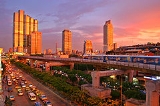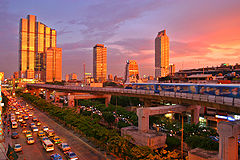
Urban ecosystem
Encyclopedia

City
A city is a relatively large and permanent settlement. Although there is no agreement on how a city is distinguished from a town within general English language meanings, many cities have a particular administrative, legal, or historical status based on local law.For example, in the U.S...
, town
Town
A town is a human settlement larger than a village but smaller than a city. The size a settlement must be in order to be called a "town" varies considerably in different parts of the world, so that, for example, many American "small towns" seem to British people to be no more than villages, while...
s, and urban strips constructed by human
Human
Humans are the only living species in the Homo genus...
s.
This is the growth in the urban population and the supporting built infrastructure has affected both urban environments and also on areas which surround urban areas. These include semi or 'peri-urban' environments that fringe cities as well as agricultural and natural landscapes.
Scientists are now developing ways to measure and understand the effects of urbananisation on human and environmental health.
By considering urban areas as part of a broader ecological system, scientists can investigate how urban landscapes function and how they affect other landscapes with which they interact. In this context, urban environments are affected by their surrounding environment but also affect that environment. Knowing this may provide clues as to which alternative development options will lead to the best overall environmental outcome.
CSE's urban ecosystem research is focused on:
- Understanding how cities work as ecological system
- Developing sustainable approaches to development of city fringe areas that reduce negative impact on surrounding environments
- Developing approaches to urban designUrban designUrban design concerns the arrangement, appearance and functionality of towns and cities, and in particular the shaping and uses of urban public space. It has traditionally been regarded as a disciplinary subset of urban planning, landscape architecture, or architecture and in more recent times has...
that provide for health and opportunity for citizens.
Current Research
- Urban Systems - research developing new technologies and providing integrated infrastructure solutions to reduce Australia’s urban ecological footprint and increase infrastructure effectiveness.
- Creating urban sustainability - (CSIRO.au Web site) CSIRO is applying its technological expertise to help Australia improve the sustainability of its cities.
- Urban Ecological Commission - a foundation dedicated to raising public awareness about the flora and fauna of big-city America
- TwinCam Futures - a new and innovative research partnership that will build regional capacity in Campbelltown and Camden for exploring the opportunities and risks of a range of possible future development pathway
See also
- EcosystemEcosystemAn ecosystem is a biological environment consisting of all the organisms living in a particular area, as well as all the nonliving , physical components of the environment with which the organisms interact, such as air, soil, water and sunlight....
- Human ecosystemHuman ecosystemHuman ecosystems are complex cybernetic systems that are increasingly being used by ecological anthropologists and other scholars to examine the ecological aspects of human communities in a way that integrates multiple factors as economics, socio-political organization, psychological factors, and...
- Media ecosystemMedia ecosystemThe media ecosystem is a term used to describe the relationship between weblogs and traditional journalism. This relationship can be seen as an ecosystem.-External links:* : In Context, #23, Fall 1989...
- Urban planningUrban planningUrban planning incorporates areas such as economics, design, ecology, sociology, geography, law, political science, and statistics to guide and ensure the orderly development of settlements and communities....
- Urban ecologyUrban ecologyUrban ecology is a subfield of ecology which deals with the interaction between organisms in an urban or urbanized community, and their interaction with that community. Urban ecologists study the trees, rivers, wildlife and open spaces found in cities to understand the extent of those resources and...

